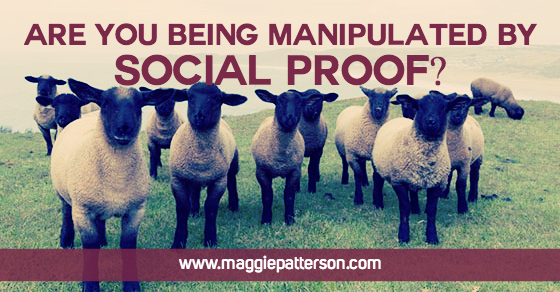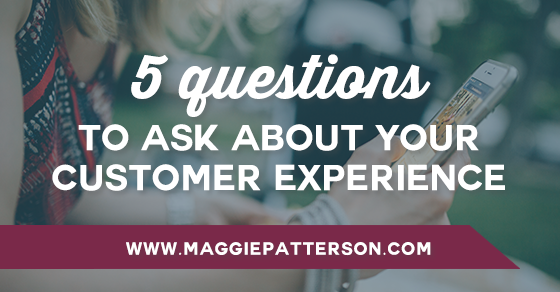
The other day a friend shared a web page with me for a $25,000 plus coaching program. It was accompanied by the message “Is this for real?”
I quickly went to check it out. I thought that with a package at that high a price point, I’d find an amazing sales page with some seriously persuasive copy. Right?
What I found there was nothing short of shocking. While the copy made me queasy, the lack of social proof on the page is what had me shaking my head. I mean, would anyone buy a package worth this much without at least some testimonials speaking to the results of the program?
It’s a mystery to me. But it got me really thinking about how we’re being manipulated by social proof. I think we use this term so loosely but we don’t really think about all the ins and outs of it. And when it’s used incorrectly, it’s a big problem for you and your business, plus, as if we’re buying anything, we need to look for it. Because buying anything without that proof is a recipe for you to get ripped off.
Why We Need Social Proof
Social Proof is a term coined by Robert Cialdini in his 1984 book Influence: The Psychology of Persuasion. In the book, he defines 6 influencing principles, one of which is social proof which plays off our desire to follow the rules.
It’s based on the psychology of “herd mentality” where we all follow the herd because it’s a shortcut for making decisions on our own. The reality is that we’re kind of lazy when it comes to deciding for ourselves so we rely on these social signals to tell us what do to. Most of the time, we don’t even realize we’re doing it.
As a seller, you definitely need social proof for your customers so you can provide them with the “signals” they need to make decisions. This comes in the form of testimonials, as seen on logos and more. Plus, you need to know some of the ways you may be shooting yourself in the foot with your social proof possibly making people not do business with you.
If you’re buying anything, you’re very likely being manipulated by social proof. To stop it and make logical and not purely emotional decisions, you need to become a student of social proof to protect yourself and make sure you’re not following the herd.
Do you want to be one of the sheep or a goddamn shepherd? Do you want to be the person buying the $25k plus coaching program that’s full of crap? Because when you invest badly, you’re basically stacking your money in a pile in the middle of your office, smothering it in lighter fluid and sending it up in flames by tossing a match as you walk out the door?
Wouldn’t you rather be the person who says “are you effing kidding me” and is willing to hold out for something that’s actually worth your hard earned dollar bills?
[Tweet “Are you a shepherd or a sheep? @magspatterson on what you need to know about social proof.”]
Next week I’ll dive into the world of how to use social proof in your business as a seller, but right now let’s focus on what we need to do to be the shepherd and not one of the sheep as a buyer:
#1. Get Clear on YOUR Desired Results
If you’re about to make an investment in anything from a $39 ebook to a $3900 program, be clear about the results you are seeking. It sounds so simplistic, but so many times we look to be told what results we actually want and we end up swept away by a tide of shoulds.
Taking the time to get really clear on what exactly we want BEFORE we start our research or read a single sales page is the only way to save ourselves. Top notch copy convinces you and converts you without you even knowing it, so if your desired outcomes are fuzzy, stop before you hit buy.
As part of that, be very specific in terms of what you want. If you’re looking to increase your income and make more money, before you look for a coach, figure out exactly by how much. There’s a big difference between doubling from $10k to $20k and $100k to $200k. With a clear outcome in mind, you can start asking the right questions so your emotional brain isn’t sucked in by engaging stories and big promises.
Only with your desired results clear can you then assess if something is truly right for you. Does the result they can deliver match what you want? Great, then look for the proof of the result with a testimonial, case study or something else that demonstrates they can walk their talk.
#2. Where Are the REAL People?
Have you ever had a bad boyfriend who made a lot of promises and didn’t deliver? Maybe he left you waiting to be picked up after work on the dodgy as hell street corner and meaning you ended up getting asked on “two” dates by dudes in minivans looking for a “good time”.
That’s sort of what buying services on the Internet is like. You make a purchase and then hope to hell you’re not stuck on the street corner and end up taking the city bus home. Which is why you want to be very discerning about who you consider doing business with in the first place.
So, where’s a girl to start? Start with their testimonials:
- Is there anyone you know there?
- Are there pictures next to testimonials?
- If you don’t know these people can you easily find them on Google?
- Do the testimonials seem to line up with what they are offering?
- Are they from this decade?
- Do the testimonials speak to results or are they all wishy washy?
See how that pans out for you and then see what else you can find, because not all testimonials are created equal. In fact, shockingly, people make this stuff up. I actually had a copywriter use my name last year in a fake quote saying what a good job she’d done.
If you’re looking at a higher value service ($1500+), ask to actually speak with someone – a real person – by email or phone. First, the person who you are purchasing from should be able to answer your questions on a one-to-one basis. Then, it’s totally okay to ask to speak with a reference. If someone says they can deliver the goods, they should be able to conjure up someone who you can speak with.
Also, take your time to look at portfolios, writing samples and anything else you can get your hands on. And if something doesn’t seem to add up and they can’t explain it. Take your hard earned dollar and run.
#3. Look for the Proof of Social Proof
One of the dirtiest social proof secrets around if you ask me, is the misrepresentation of “as seen on” by modern day snake oil salespeople. I’ve written about this in detail here with examples, but no post on social proof would be complete without this.
As the saying goes, let the buyer beware. The As Seen On bar lurking on many home pages needs a little more verification, which is why you should always look for an associated press page.
Look to see if the press logos lineup with what’s on the press page. How recent is that coverage? Being featured in Forbes eight years ago for another business isn’t good enough.
There’s entire businesses masquerading as experts on authority that are teaching people how to game the system using citizen journalism and press releases to get those press logos. So please don’t take them at face value. And if they don’t have a press page, I’d question where those logos actually came from and not factor that kind of social proof into any decision making.
#4. Take Everything With a Salt Shaker
When you’re aiming to be the shepherd and not just one of the sheep, it’s up to you to buck the norm and not fall into a groupthink.
Just because your friend or your buddy in a Facebook group says someone’s the best thing around doesn’t mean you need to accept it. Be skeptical. Don’t settle for taking it with a grain of salt, bring the whole damn salt shaker as you assess what’s what.
If you pay careful attention and you hang out in online groups, you’ll see the consistent pattern of groupthink at play. Which really just is like social proof on steroids because people truly don’t want to have to decide for themselves.
Let’s face it. No one wants to be the one to ask the hard questions for fear or reprisal or being told you have an upper limit problem because you dare question the norm. So, Instead, people take what others say as tacit approval, they chalk it up to them being too {fill-in-the-blank} and they follow along.
Do you know how many times when I DO say something that people say “OMG, thank you, I thought I was the only one who thought that?” More times than I could ever count, and that sigh of relief I can hear when they say that is palpable.
It’s a clear indication that we all need to speak up more. We need to do it thoughtfully but in a way that raises the bar on what we all expect from ourselves and other business owners.
If no one raises their damn hand and throws down on the cult of personality and says “hey, wait a second, something here just isn’t right.” Next thing you know, someone who has no business being in business is a superstar because people believe everything they’re told.
That’s what sheep do.
You, you’re a shepherd. It’s up to you to show up and lead your flock. Do your homework, ask better questions and spend your hard earned dollar wisely. And run screaming from $25k coaching offers with no testimonials or specific outcomes.
[Tweet “Lead your flock. Do your homework and spend wisely. Post from @magspatterson “]
Next up, social proof on the sellers side of things in a much less feisty voice.


